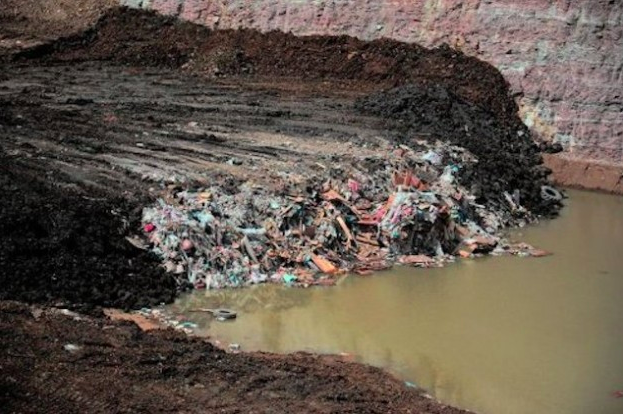In an explosive allegation, Russian investigative journalists have reported that a prominent environmental activist may have been beaten late last year for documenting the construction of a mansion for Russia’s prime minister on the Black Sea Coast’s protected lands.
In an explosive allegation, Russian investigative journalists have reported that a prominent environmental activist may have been beaten late last year for documenting the construction of a mansion for Russia’s prime minister on the Black Sea Coast’s protected lands.
Andrei Rudomakha, coordinator of the Environmental Watch on the Northern Caucasus, was attacked in late December by unknown assailants in Krasnodar in southern Russia and hospitalized with traumatic brain injuries, chemical eye burns and facial fractures.
Prior to the attack, Rudomakha and several other activists from the group had documented what they say is a mansion – complete with a Russian Orthodox chapel and vineyards – being built illegally for Prime Minister Dmitry Medvedev.
 A chapel built as part of a lavish illegal mansion allegedly built for Russian Prime Minister Dmitry Medvedev.
Credit: Environmental Watch on the North Caucasus
A chapel built as part of a lavish illegal mansion allegedly built for Russian Prime Minister Dmitry Medvedev.
Credit: Environmental Watch on the North Caucasus
On Sunday, Novaya Gazeta, the swashbuckling investigative newspaper in Moscow, published photos Rudomakha says he was attacked for taking. They show tree felling and construction machinery on a protected swathe of forest near the swank Black Sea vacation community of Gelendzhik. The paper further published evidence that the Federal Security Service, or FSB, has for the last two years been specifically harassing members of Rudomakha’s group.
Environmental Watch on the North Caucasus came to prominence by revealing the scale of official corruption and willful environmental negligence surrounding Russia’s 2014 Sochi Winter Olympics – efforts that forced one of its activists to flee the country and drove another into a prison camp for two years.
In the course of those investigations, the group revealed that dozens of billion dollar vacation homes for President Vladimir Putin, the patriarch of the Russian Orthodox Church, Krasnodar’s governor and other friendly politicians had been built in protected forests on the shores of the Black Sea.
 Construction equipment on the site of a mansion allegedly built for Russian Prime Minister Dmitry Medvedev.
Credit: Environmental Watch on the North Caucasus
Construction equipment on the site of a mansion allegedly built for Russian Prime Minister Dmitry Medvedev.
Credit: Environmental Watch on the North Caucasus
The group also catalogued illegal land grabs, shady business deals and legislative manipulations orchestrated by the government during Moscow’s drive for the most expensive Olympics in history, which weighed in at $52 billion.
Railroad and highway construction around Sochi led to a plague of toxic and illegal landfills spread throughout the area’s protected forests, and landslides and construction waste from Alpine ski resorts owned by Kremlin connected businessmen continue to foul drinking water for more than 100,000 people living in the area.
The group came under heavy handed surveillance during the Sochi Winter Games, and official rancor over its revelations grew so corrosive that, at one point, police horsewhipped activist gathering in Sochi to protest the corruption and environmental degradation detailed in their incendiary Olympic report.
But the group says official pushback has been worse since 2016, and documents revealed by Novaya Gazeta’s report corroborate that. It was in that year, according to the paper’s investigations, that a construction company owned by a former classmate of Putin began building the summer mansion for Medvedev.
That year also saw the beginning of a covert campaign by the FSB to intimidate and sabotage the group’s investigations into the lavish vacation homes sprouting up in the forests around Sochi. The newspaper described numerous documents obtained from law enforcement sources detailing a sanctioned harassment campaign.
 Andrei Rudomakha of the Environmental Watch on the Northern Caucasus. (Photo: Facebook)
Andrei Rudomakha of the Environmental Watch on the Northern Caucasus. (Photo: Facebook)
Since the attack, Rudomakha and another member of the group, Dmitry Shevchenko, have been receiving anonymous death threats from an email address that translates to “death to Rudomakha.” The threats targeted the group for taking “foreign funding” to “destroy Russia,” and urge the two to leave the country or be killed.
The activists say Rudomakha’s attackers had evidently been briefed on where to find him, and on what to take when they found him – information they assert could only have come from the regional FSB office. Several other activists from the group were also harassed by officials to turn over photos and video in the wake of the attack.
Meanwhile, Prime Minister Medvedev has since last year become the face of Russian corruption. In March, hundreds of thousands of protestors in 82 Russian cities turned out in anti-corruption demonstrations after it was alleged that Medvedev had amassed a collection of palaces, yachts and vineyards during his time in office.
Those allegations were publicized by Alexei Navalny, who, after a series of official manipulations, has been disqualified from running against Putin in Russia’s upcoming presidential election in March.
Revelations about yet another lavish home for Medvedev could become political poison in a year when Russians are being asked to consider leaving Putin and his administration in the Kremlin for another four years.
Because of this, the attack on Rudomakha and what his photographs have revealed have already resonated. More than 113,000 people have so far signed a change.org petition calling on authorities to investigate the attack and the subsequent death threats.







